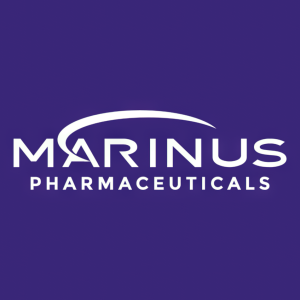Marinus Pharmaceuticals Comments on Patent Challenge by Ovid Therapeutics Inc. and Provides Update on Marinus’ Post Grant Review
“Over the past two decades, Marinus has invested more than
Between 2021 and 2023, Marinus was granted two method of use patents (
Marinus’ first provisional patent application for ganaxolone in SE was filed in February 2015. In August 2016, Ovid filed a provisional patent application on the use of ganaxolone in epileptic disorders, despite having no ganaxolone development programs.
In March 2023, Marinus initiated a Patent Trial and Appeal Board (PTAB) post-grant review (PGR) challenging Ovid’s SE patent for ganaxolone (
In response to Marinus’ request for PGR, Ovid abandoned 23 of the 31 claims in its patent. The Patent Office subsequently instituted the PGR on the remaining claims. Marinus believes Ovid’s swift action in relinquishing the majority of their claims underscores the merits of the PGR challenge. In instituting the PGR, the PTAB stated that it was more likely than not that Marinus would be able to invalidate the remaining eight claims of the Ovid ‘817 Patent. The PGR process is ongoing, and a final decision is expected by the middle of 2024. Marinus most recent filing in the PGR can be found here.
Marinus emphasizes its long-standing commitment to developing innovative therapies for patients with rare genetic epilepsies and refractory seizure disorders and remains focused on its mission to bring ganaxolone to patients in need.
About Marinus Pharmaceuticals
Marinus is a commercial-stage pharmaceutical company dedicated to the development of innovative therapeutics for seizure disorders. The Company first introduced FDA-approved prescription medication ZTALMY® (ganaxolone) oral suspension CV in the
Forward-Looking Statements
To the extent that statements contained in this press release are not descriptions of historical facts regarding Marinus, they are forward-looking statements reflecting the current beliefs and expectations of management made pursuant to the safe harbor provisions of the Private Securities Litigation Reform Act of 1995. Words such as "may", "will", "expect", "anticipate", "estimate", "intend", "believe", and similar expressions (as well as other words or expressions referencing future events, conditions or circumstances) are intended to identify forward-looking statements. Examples of forward-looking statements contained in this press release include, among others, statements regarding the Marinus’ patent portfolio and the related IPR filed by Ovid and the PGR filed by Marinus; and other statements regarding the company's future operations, financial performance, financial position, prospects, objectives and other future events.
Forward-looking statements in this press release involve substantial risks and uncertainties that could cause our clinical development programs, future results, performance or achievements to differ significantly from those expressed or implied by the forward-looking statements. Such risks and uncertainties include, among others, our ability to prevail in the IPR and PGR, the company’s ability to continue as a going concern; unexpected market acceptance, payor coverage or future prescriptions and revenue generated by ZTALMY; unexpected actions by the FDA or other regulatory agencies with respect to our products; competitive conditions and unexpected adverse events or patient outcomes from being treated with ZTALMY, uncertainties and delays relating to the design, enrollment, completion, and results of clinical trials; unanticipated costs and expenses; the company’s cash and cash equivalents may not be sufficient to support our operating plan for as long as anticipated; our ability to comply with the FDA’s requirement for additional post-marketing studies in the required time frames; the timing of regulatory filings for our other product candidates; clinical trial results may not support regulatory approval or further development in a specified indication or at all; actions or advice of the FDA or EMA may affect the design, initiation, timing, continuation and/or progress of clinical trials or result in the need for additional clinical trials; the size and growth potential of the markets for the company’s product candidates, and the company’s ability to service those markets; our ability to develop new formulations of ganaxolone or prodrugs; our ability to obtain, maintain, protect and defend intellectual property for our product candidates; the potential negative impact of third party patents on our or our collaborators’ ability to commercialize ganaxolone; delays, interruptions or failures in the manufacture and supply of our product candidate; the company’s expectations, projections and estimates regarding expenses, future revenue, capital requirements, and the availability of and the need for additional financing; the company’s ability to obtain additional funding to support its clinical development and commercial programs; the potential for our ex-US partners to breach their obligations under their respective agreements with us or terminate such agreements in accordance with their respective terms; the risk that drug product quality requirements may not support continued clinical investigation of our product candidates and result in delays or termination of such clinical studies and product approvals; and the availability or potential availability of alternative products or treatments for conditions targeted by us that could affect the availability or commercial potential of our product candidate. This list is not exhaustive and these and other risks are described in our periodic reports, including the annual report on Form 10-K, quarterly reports on Form 10-Q and current reports on Form 8-K, filed with or furnished to the Securities and Exchange Commission and available at www.sec.gov. Any forward-looking statements that we make in this press release speak only as of the date of this press release. We assume no obligation to update forward-looking statements whether as a result of new information, future events or otherwise, after the date of this press release.
View source version on businesswire.com: https://www.businesswire.com/news/home/20240327247358/en/
Investors
Jim DeNike
Senior Director, Investor Relations
Marinus Pharmaceuticals, Inc.
jdenike@marinuspharma.com
Media
Molly Cameron
Director, Corporate Communications & Investor Relations
Marinus Pharmaceuticals, Inc.
mcameron@marinuspharma.com
Source: Marinus Pharmaceuticals








